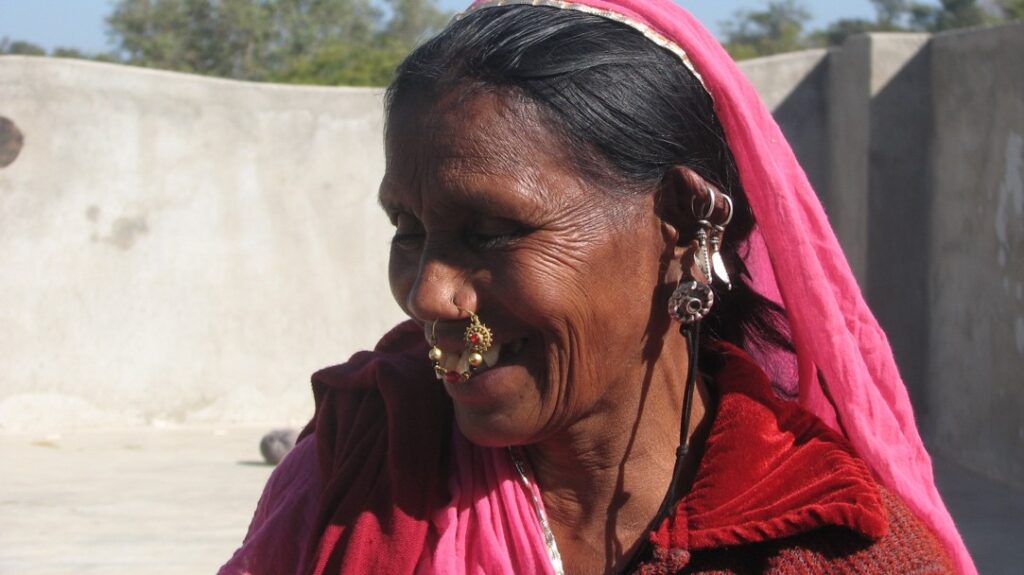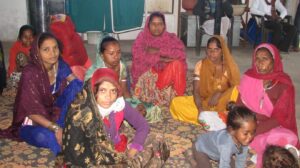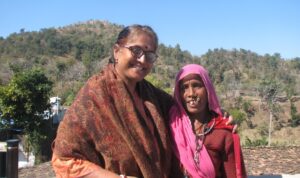Swagibai Gameti confidently tells me her address – village Patiya – but falters when I ask her age – perhaps it is forty or fifty, she says with a shrug. Her spontaneous smile is ageless indeed. We are sitting on the roof of the nurse quarter at the Amrit clinic at Morwal, district Udaipur. I casually admire the beauty of the hills that seem so close to where we are sitting, but Swagibai has a totally different perspective. “Those hills are treacherous,” she says, “It takes more than an hour’s walk to reach the Adivasi hamlets that dot the hillside and then an hour’s walk back. One hour to walk to the village, one hour for the meeting, one hour to walk back.” Her remark brings home the reality of the challenges of nature and the hard physical work that the Swasthya Kirans do in order to bring the message of health and well-being to the furthest village.
It is Friday – Doctor’s Day at Morwal Amrit clinic, and Swagibai arrives early with a grou p of women and a couple of men. The majority of the women are young, pregnant women who have come for their ANC checkups. A few have come with children – one child has a severe eye infection. Swagibai sits with the women, talking to them and later she acts as an interpreter for the doctors who are not conversant with the local bhashas like Vagdi and Dhavdi spoken by the Adivasi women.
p of women and a couple of men. The majority of the women are young, pregnant women who have come for their ANC checkups. A few have come with children – one child has a severe eye infection. Swagibai sits with the women, talking to them and later she acts as an interpreter for the doctors who are not conversant with the local bhashas like Vagdi and Dhavdi spoken by the Adivasi women.
Around six years back Hemant who works with BHS went to Swagibai’s house and asked her whether she would want to help the villagers in their illness. “I was ready and my husband was also supportive, but I was hesitant in the beginning because I have never gone to school. What could an illiterate person like me do? But I decided to go anyway. The organization provided us several trainings, which helped me learn the work.”
Swagibai has attended training sessions in Udaipur, Salumber, Gogunda and Baroda. Today she knows the symptoms of various diseases like malaria, TB, anemia in women and children and can identify patients in the community. She can also convince them to seek healthcare intervention because Swagibai has a way of talking to villagers that convinces them. “Suppose I meet an ill person who appears to have TB, I don’t ask them whether they have lost weight, I ask them whether their clothes have become loose. Then I discuss other symptoms. And by the end of the conversation, they are ready to come with me to the clinic.”
As a Swasthya Kiran, Swagibai takes care of the primary health needs of 250 households who live in the four hamlets in her work area. The Adivasi community in this far-flung and difficult terrain battle poverty and lack of livelihood opportunities. Their tiny landholding barely produces enough food for a part of the year and survival makes them migrate to distant cities in search of work. Tuberculosis and other diseases like the dreaded silicosis are on the rise because of migration and hazardous work conditions.
“People are poor and reluctant to come to the hospital,” narrates Swagibai, “One woman called Dalmi bai suffered tuberculosis for six months at home without seeing a doctor. She lay in her cot the entire day. I met her husband and requested him to bring her to the clinic, but he refused saying that she is going to die anyway, so why should he waste his money on her? I lifted her with my own hands and spent my own money to bring her to the clinic to see the doctor. I made sure that she continued her medicines and food. She recovered completely.”
“So, what did her husband say then?” I ask. It is a question that she laughs away.
“He did not say anything, but she was grateful.”
In the last six years, Swagibai has convinced more than a hundred tuberculosis patients to come to the clinic. She identified more than 150 severely malnourished children and brought the parents and even grandparents to the clinic to learn about nutrition. “Today,” she informs me, “there are only six malnourished children in the SAM category in my area.”
Substance addiction is a problem that Swagibai describes in great detail. In the past, Adivasis would brew liquor in their own homes for personal consumption, but now there are illegal thekas which have ruined many families. She is concerned that alcohol addiction has an adverse effect on children. “If both parents sit and drink, who will take care of the kids?” It is not just liquor but gutkha, tobacco, bidis and Vimal pouches that are taking a toll on people’s health and well-being.
Adivasis would brew liquor in their own homes for personal consumption, but now there are illegal thekas which have ruined many families. She is concerned that alcohol addiction has an adverse effect on children. “If both parents sit and drink, who will take care of the kids?” It is not just liquor but gutkha, tobacco, bidis and Vimal pouches that are taking a toll on people’s health and well-being.
From ensuring that women come for ante-natal and post-natal care, to accompanying women for institutional deliveries, ensuring babies are brought for vaccination and fed healthy food to promoting menstrual hygiene and birth control measures to making home visits – Swagibai takes everything in her stride. Although there are larger issues that she may not be able to tackle or change, the spirited Swagibai declares that she will work till her ‘hands and feet are able to move’ – she is her life-long mission to go door-to-door, telling villagers to take care of their health.
During the Covid pandemic, Swagibai overcame her own fears to reach out to villagers. Some people were callous and refused to believe that they were in the midst of a pandemic, they insisted that it was a hoax. “They would laugh at me saying – it is only cough and cold and fever. Are you seeing cough and cold for the first time?” On the other hand, there were patients who avoided going to the clinic because of the stigma attached to the disease. Swagibai met all these challenges with great patience, never losing her calm demeanour. To her great credit, she brought many patients to the clinic, often paying for their travel and distributed masks and medicines in the community. There are no words to express the respect that I felt for gentle woman and her uncommon kindness. Why is it, I thought, is that some of the richest people I have met do not have a fraction of the generosity that Swagibai has? Swagibai’s beauty is totally unselfconscious – removing some money from her small cloth purse for another villager is done even thinking about it, without any desire for acknowledgment or celebration. It is done in the spirit of humanity that is as precious as rare.
I look at this elderly woman, bedecked in traditional silver jewelry from head to toe and ask her how her own life has changed in the last six years.
“Everybody knows me now, they recognize me. I am respected by the women auratein manti hai. They seek my advice and welcome me with maan manuhar, gifts of fruits and vegetables, whenever I go to their house. Even when I refuse to accept these gifts, they insist. This is the biggest happiness in my life – the respect from women. They hug me when they see me gale milte hain. It is the best thing that I stepped out of my home. How else would I have met everyone? How else would I have met you?” Swagibai laughs.
auratein manti hai. They seek my advice and welcome me with maan manuhar, gifts of fruits and vegetables, whenever I go to their house. Even when I refuse to accept these gifts, they insist. This is the biggest happiness in my life – the respect from women. They hug me when they see me gale milte hain. It is the best thing that I stepped out of my home. How else would I have met everyone? How else would I have met you?” Swagibai laughs.
Written by Paromita Goswami
